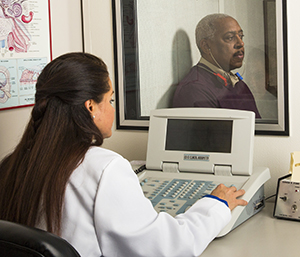An audiometric test measures how well you hear. It's quick and painless. The Occupational Safety and Health Administration (OSHA) and your employer may require this test each year. Follow through with it. You can't "fail" a hearing test. The test results just help your employer know whether more hearing protection is required.
What to expect
You may be tested in a clinic or in a mobile testing van. The test lasts only a few minutes and is easy to do. An audiologist (hearing specialist) will give you headphones and seat you in a soundproof room. The audiologist will then play tones at many pitches and volumes. When you hear the tones, you press a button or raise your hand.
Your test results
The test result is a graph called an audiogram. It shows how well you hear. The result of your first hearing test will be your baseline. Future tests will be compared to your baseline to see whether your hearing has changed. If your test shows a change from your baseline, you may be tested more often. It could mean that you and your employer need to change the type of protection you usually wear.


